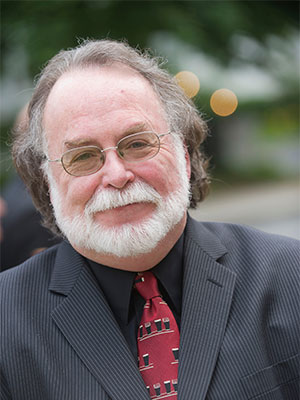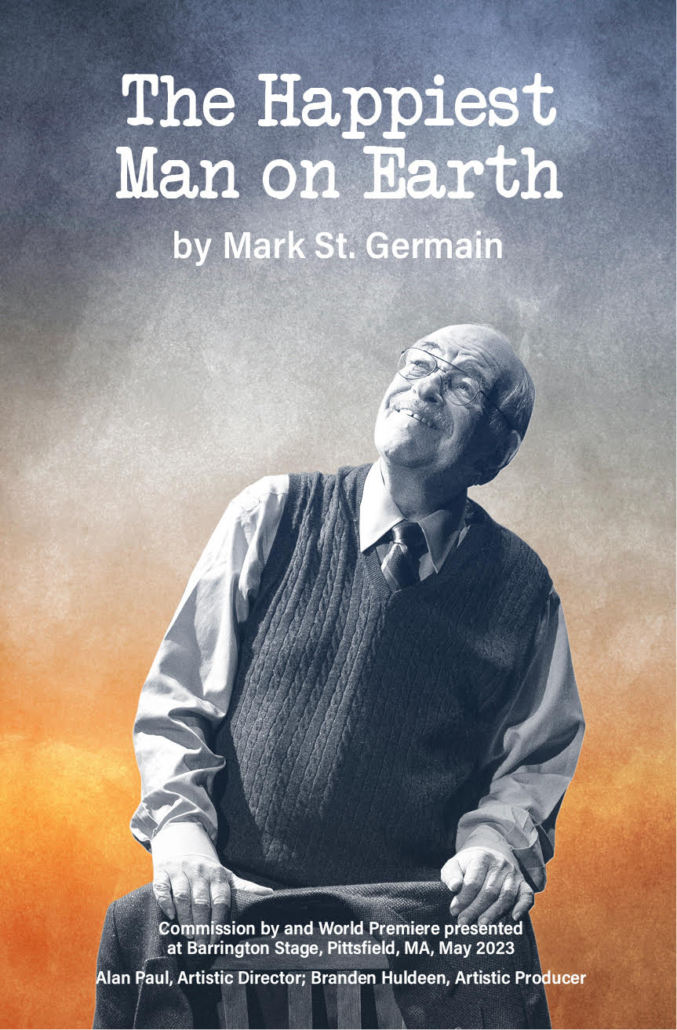Meet Mark St. Germain
Mark has written for film, television, and the stage. He is a recipient of the Outer Critics Circle Award, the Lucille Lortel Award, and the Off Broadway Alliance Award.
Mark has written the plays Freud’s Last Session, Camping with Henry and Tom, Forgiving Typhoid Mary (Time Magazine’s “Year’s Ten Best”), and Becoming Dr. Ruth, the story of Dr. Ruth Westheimer. Other plays include Scott and Hem, Best of Enemies, Ears on a Beatle, Dancing Lessons, Relativity, and Out of Gas on Lover’s Leap.
All have been done extensively, nationally, and internationally. His play The God Committee has been made into a movie. His film adaptation of Freud’s Last Session, starring Anthony Hopkins and Matthew Goode, was recently released.
His most recent play, The Happiest Man on Earth, that premiered at Barrington Stage in May of 2023, will be seen Off-Broadway this spring.
With Randy Courts, he has written the musicals The Gifts of the Magi, Johnny Pye, and Jack’s Holiday (Playwrights Horizons). His musical, Stand by Your Man, The Tammy Wynette Story was created for Nashville’s Ryman Theater. With John Markus, he wrote the comedy with music, The Fabulous Lipitones.
Television work includes “The Cosby Show,” Dick Wolf’s “The Wright Verdicts.”
Mark is a member of the Dramatists Guild, the Writer’s Guild East, and an Associate Artist at the Barrington Stage Company, where a theater is named for him.
His books, Walking Evil: How Man’s Best Friend Became My Worst Enemy, and The Mirror Man, a thriller, are available on Amazon.
Interview with the Playwright
Conducted and edited by Sharon J. Anderson
Did the irony of the title of Eddie Jaku’s memoir, The Happiest Man on Earth, not to mention, the subtitle, “The beautiful life of an Auschwitz survivor,” inspire you to write this play?
It wasn’t irony that caught my imagination – it was the title. The minute I heard about the title, I wanted to find out why this person was so happy. Maybe there’s a clue. I didn’t know what the subject was, so I ordered the book and then was really captivated.
Why did you want to know why?
If somebody is the happiest man on earth, I’m just intrigued. What makes them so happy? Is it some philosophy they have? What are they doing that makes them happy?
What’s it like to put yourself into the shoes of someone who experienced the unimaginable?
It’s incredibly painful because you have to identify with the character, and in this case, it’s a person who lived through so much suffering. The play captures a lot of what Eddie went through, but there were still things that weren’t included in the book – his moods, for example – how Eddie had to steel himself to get through some of these horrible situations. Kenneth Tigar, who will be portraying Eddie for the third time, is an amazing actor.
How did you determine what parts of the book to include in your play?
I included those parts that pushed the drama along such as any part with a conflict. At first, I wanted to write a play with a length that would keep an audience’s attention, and the first draft came up a little short. After talking with the director, I put in a couple more incidents. Once I could hear Ken do it, then it pretty much edited itself. The actor, the playwright and the director all worked together – there was really good teamwork in this.
Eddie is not just a happy man, but the “happiest man on earth.” Is this a “Pollyanna” perspective – is he excessively or blindly optimistic?
I don’t think do. I was stunned by how many survivors committed suicide after getting out of the camps. My thought was that they finally escaped these horrors – so why would they take their own lives? Eddie was in that frame of mind. He was very, very unhappy even after he met his wife and fell in love. Even after he got married, he was still depressed. He claims that he suddenly saw the world in a different way when his first son was born.
That moment is in your play. While on the way to the birth of his first son, Eddie says, “What could I tell this child? I’ve seen the worst of humanity . . . why should we go on at all – for more pain, more suffering?” Moments later he holds his son and says, “In that moment, my heart was healed.” How does that happen? Do you have children?
I do, and that does happen. It’s pretty magical. You have to live in a different way after you have a child. First of all, there’s the magic of birth, and then you are holding this totally, innocent baby that depends on you and you have to help them through life. Before the birth, you are seeing the world through your eyes and after the birth, you are seeing the world through the child’s eyes as well. It becomes a different world.
The story is reportorial rather than analytical . . .
It is the best thing for drama because there is no reflection. The reflection only comes toward the end of the play when Eddie is out of the camps and is able to think about the world again and what it means to survive. At the beginning, it wasn’t enough that Eddie survived, he needed to survive for someone.
Do you identify with Eddie?
Sure, not with his experiences, but yes, in my experience, children do make you a different person. Hopefully if you are a good parent, your focus goes off of yourself to another human being which totally changes you.
Do you become a better person?
I don’t know if you become a better person, but you do become a different person; certainly, a less selfish person. If you’re not, it’s a nightmare.
What do you think of this perspective: “the first step toward dehumanization is taken through language”?
The Nazis somehow had to insulate themselves from all this horror, so if you believe that whoever you’re dealing with isn’t a real person, that they are just vermin, it’s much easier to exterminate them.
About Auschwitz, the average twenty-first century citizen assumes that Jews arrived in cattle cars and were led into what they thought were showers, where they were gassed to death, their bodies turned to ash in ovens. But that is an incomplete picture, isn’t it?
There was so much prolonged torture for so many working in fields, caves, factories. Eddie could have been sent to the crematorium at any time, but the thing that saved him was his education which his father said it would. Eddie was useful, and as long as he was of use, there was no reason to put him to death. The minute he wasn’t of use, there was no reason to have him around.
In many diabolical ways the Holocaust has been “normalized.” After the world’s initial outrage following the war, there has been a tendency to negate the specificity and enormity of the genocide against the Jewish people.
It’s such a horror that it’s hard to take in. People can’t assimilate that fully, and when they do, it really stops you in your tracks. I think the biggest danger now is that many younger people have no concept of it. In their minds, it happened so long ago it’s almost not real.
One of the things we did was have student matinees for grammar and high school students. You could hear a pin drop. They were amazed by the story and its brutality.
The title of one of the chapters in Eddie’s book is, “Hug Your Mother” . . .
He lost his parents early and was devastated to be sent away from them to go to school. He was able to see them for short periods of time after that. But he went through his teen years without his parents. All he had was loss and longing, so yes, he wants us to hug our mothers.
Eddie believes in simple acts of kindness: invite a loved one for a meal, go for a walk, lean on friends in both good times and bad . . .
It’s his personality. I wish I could be focused on the good as he is. We all should be. With all that is going on in today’s world – it’s reprehensible – and yet he went through the most reprehensible situation and was still able to come out of it a positive person.
Why are you drawn to writing plays about historic figures?
Because they are interesting to spend time with. The older I get, the more I think that I only want to write about people who have a positive impact on the world. I don’t want to write about a character that’s despicable. It might be interesting theoretically, but I don’t want to spend time with that person. It takes months to write a play and when you’re in the company of Eddie or Eleanor Roosevelt or a lot of the people I’ve written about, you’re in good company.
Elie Wiesel has said, “Write only if you cannot live without writing. Write only what you alone can write.” What can only you write?
I’ve tried a lot of different forms. I’ve tried television, I’ve tried film and to me, I’m much more comfortable writing for the theater because there is more of a connection between the audience and your words.
Can you live without writing?
No, because when I’m not working on something, I’m absolutely miserable and really difficult to live with.
Are you a happy man?
Happy enough.
If you had one piece of advice for a loved one, what would it be?
Maybe I say this too much to my kids: “Never give up.” It is Eddie’s story.
What is one question you wish an interviewer would ask you?
Perhaps about the project I am working on currently – it is biographical, but more fictional. It is about a high school football player who has had two concussions. It is a debate between his parents about whether he can play the final game. The father is a former real sports man and is totally against his son playing. The mother sees that this is what her son lives for and wants him to play.
What image immediately comes to mind when I say the word, “love?”
Specific people that I have loved. And my children, definitely my children.
What image comes to mind when I say the word, “family?”
Again, my children and my friends. Some people I’ve met along the way have become family like Dr. Ruth. People who expand my world are family.


